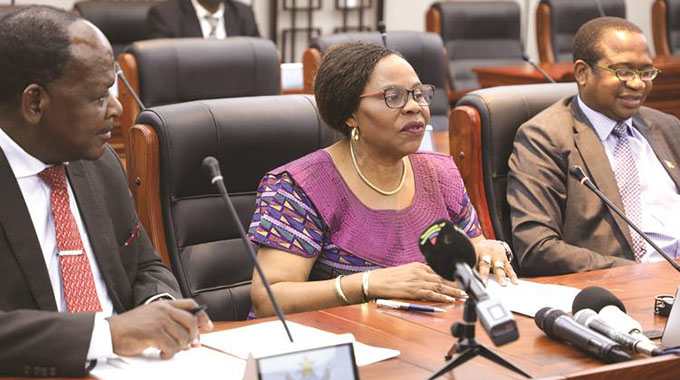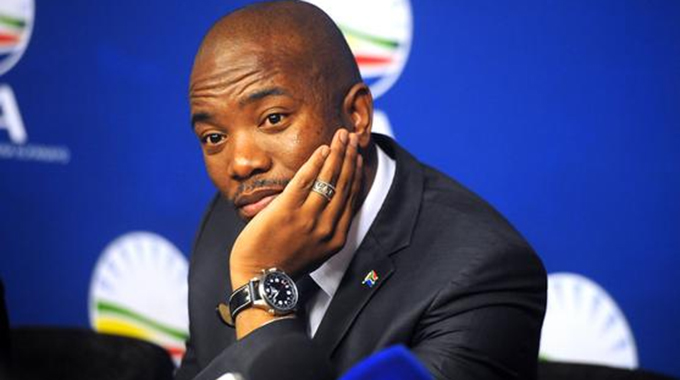38th Cabinet meeting decisions matrix

October 29, 2019
1. Update on the Public Works and the Small-Scale Irrigation Schemes Rehabilitation Programmes
The Minister of Presidential Affairs and Monitoring Implementation of Government Programmes briefed Cabinet on the Public Works and Small-Scale Irrigation Schemes Rehabilitation Programmes.
The Minister reported that the District Development Fund (DDF) had initiated the Public Works (or Food-for-Work) Programme, whereby the able-bodied from communities in food-deficit areas carry out routine road and other infrastructure maintenance programmes in return for food.
This excludes the elderly, the sick and child-headed families who are supported by the Department of Social Welfare. Already, 25 000 kilometres of roads have been maintained across the country’s eight rural provinces.
The Fund is also constructing new bridges and irrigation schemes; rehabilitating those damaged by Cyclone Idai and other extreme weather conditions; as well as restoring minor structures such as inverts, culverts, drifts and pipe drifts.
Currently, a total of 200 beneficiaries per district on average, are employed under the Public Works Programme which serves the dual purpose of ensuring public infrastructure development and providing drought relief to distressed communities.
Each Public Works participant is paid a monthly stipend and a 50kg bag of maize from the Social Welfare Department.
The Minister also advised Cabinet that the DDF is engaged in activities aimed at improving water supply in the country’s eight rural and two metropolitan provinces.
To this end, a total of 600 boreholes (that is 60 per province) are being drilled. Four boreholes per parliamentary constituency are also being repaired using funds provided by the Ministry of Lands, Agriculture, Water, Climate and Rural Resettlement under the Water Fund.
To date, Matabeleland North, Masvingo, Manicaland, Mashonaland East, Central and West Provinces have received sufficient borehole repair spares.
Furthermore, the DDF is constructing and resuscitating small irrigation schemes in line with the National Irrigation Development Programme, which targets to place at least 200 hectares per district under irrigation.
Examples of schemes under construction or rehabilitation include Hozoli in Silobela, Cashel Valley in Chimanimani, Duncal in Esigodini, Mutondwe in Bindura, Dongaronga in Chegutu and Chentali in Hwange.
- Report on the Russia-Africa Summit and Economic Forum
The Minister of Foreign Affairs and International Trade briefed Cabinet on the Russia-Africa Summit and the First Russia-Africa Economic Forum, which His Excellency the President attended from 22 to 24 October, 2019 in Sochi, Russia. The fora gave opportunity for the President to promote Zimbabwe’s investment opportunities and the country’s re-engagement agenda. Highlights of the Summit and Economic Forum include the following:
The Summit was attended by 2000 Russian companies thus demonstrating that emphasis was more on economic ties rather than political relations;
During the last five years, Russia has doubled trade with Africa and would strengthen economic cooperation by establishing business councils with African countries, increasing trade missions to Africa and leveraging on the Continental Free Trade Area Agreement;
Solicitation by the Trade and Investment Chamber of Russia for joint investment projects with African countries including in the oil and gas, diamonds, information, and Special Economic Zones sectors; and
The writing off of US$20 billion worth of debt by the Russian Federation, in order to enable the benefiting countries to use those resources to spur economic growth.
His Excellency the President Cde E.D. Mnangagwa also briefed the Summit on Zimbabwe’s ongoing socio-economic reforms and called for support for the country’s efforts to have the sanctions unilaterally imposed on it by the Western nations removed forthwith. He further called for the reform of the UN Security Council to make its membership more equitable and representative of all the world’s nations.
At the country level, the Minister of Mines and Mining Development; and Finance and Economic Development had, respectively, signed the following two Memoranda of Understanding with the Russian Minister of Natural Resources:
(i) Cooperation in Geological Exploration and Exploitation of Mineral Resources; and
(ii) Cooperation in Environmental Protection and Sustainable Use of Natural Resources.
The memoranda will go a long way in boosting economic growth, which is Government’s key priority post the ongoing austerity measures.
- Phase 2 of the Ease of Doing Business Reforms in Zimbabwe
Cabinet received an update on the Second Phase of the Implementation of Ease of Doing Business Reforms, which the Minister of Finance and Economic Development presented. The reforms are based on the 10 World Bank Doing Business indices, namely: starting a business; construction permits; access to electricity and other public utilities; registering property; access to credit; protecting minority investors; payment of taxes; facilitation of cross-border trade; enforcement of contracts; and resolution of insolvency.
Cabinet noted with satisfaction that to date, His Excellency the President has assented to eight of the 16 pieces of legislation which required consequential amendment or enactment.
For instance, four Commercial Courts have been established in the country’s major cities. To give due prominence to the reforms, Cabinet agreed to set up an Inter-Ministerial Cabinet Committee or Task Force of key line ministries to superintend the Ease of Doing Business Reform Programme in order to transform the country’s business environment, promote local and foreign investment, create wealth and jobs and improve overall economic performance.
You may be aware that we recently rose up the World Bank Competitive Index by 15 places as a country, from 170 out of 190 countries in 2015 to the current 140.
- State Enterprises Reform Programme: Petrotrade
Cabinet received and approved proposals for the partial privatisation of Petrotrade, as presented by the Minister of Finance and Economic Development, being part of the ongoing State Enterprises Reform Programme.
Under the proposals, Petrotrade and Genesis Energy, together with CMED’s fuel retail component, will be merged in order to enhance the resultant entity’s value, attractiveness and competitiveness ahead of negotiations with prospective strategic partners.
- Update on Medical Doctors’ Illegal Job Action
Cabinet was informed by the Minister of Information, Publicity and Broadcasting Services, as the Acting Minister of Health and Child Care, that the public hospitals medical doctors’ strike has now gone beyond 56 days. Medical services at the hospitals remain constrained, especially at Harare and Bulawayo hospitals where the absence of doctors is more pronounced.
As such, disciplinary hearings for the striking doctors who did not comply with the Labour Court judgment directing them to return to work within the prescribed period will commence on Friday, 1st November, 2019. The doctors have confirmed receipt of disciplinary hearings papers. Meanwhile, salaries will only be paid to doctors who were providing services. Government has also intensified efforts to sustainably ameliorate the situation in the public health sector.
- The Scourge of Incessant Price Hikes
Cabinet discussed in considerable detail the urgent need to take steps to address the price hikes that are affecting citizens through the erosion of incomes.
While noting the concern, Cabinet generally attributed the price hikes to currency volatility, the apparent application of replacement pricing by business owners, adverse inflationary expectations, the high cost of electronic financial transactions, shortage of cash in the economy, and increased demand for foreign currency to fund imports.
Accordingly, Cabinet wishes to inform the nation that in the short to medium term, the situation alluded to will be addressed through the systematic injection of more cash into the economy in a manner that does not exacerbate money supply growth and which erases cash arbitrage opportunities and promotes currency stability. Social safety nets will also be strengthened through the setting up of a fund for the production of affordable basic commodities.
Cabinet also took cognisance of the urgent need to reduce the cost of digital transactions as well as come up with a Social Contract under the Tripartite Negotiating Forum, which brings together Government, business and labour in order to agree on mechanisms to ensure a stable macro-economic environment taking into account salaries and prices of goods and services.
Cabinet further stressed the need to raise productivity in all sectors of the economy, with each sector Minister being required to come up with appropriate incentives.
- Principles for the Amendment of the Public Procurement and Disposal of Public Assets Act (Chapter 22:23)
Cabinet considered and approved Principles for the Amendment of the Public Procurement and Disposal of Public Assets Act (Chapter 22:23), which were presented by the Attorney General. The amendments seek to rectify some deficiencies identified in the Act in order to ensure that it fulfils its major objective, namely: to effectively provide for the control and regulation of public procurement and the disposal of public assets so as to ensure that such procurement and disposal is done in a manner that is transparent, fair, honest, cost-effective and competitive.
The proposed amendments to the Act are as follows:
(i) Extending Section 3(6) of the Act to cover not only construction works but also goods and services;
(ii) Providing for exemption of State enterprises operating in competitive markets from publication of procurement notices since such publication exposes their strategic intentions, thereby prejudicing their competitive positions;
(iii) Providing for explicit offences or violations of the Act and associated penalties;
(iv) Providing for the purpose of the transitional period specified in Section 103(1) of the Act, and extending the period of transition by a further 12 months;
(v) Deleting Section 54(2)(a) in order to exclude the Auditor-General from being a member of the Special Procurement Oversight Committee (SPOC) so as to prevent the appearance of conflict of interest;
(vi) Amending Part X of the Act in order to allow for more flexibility in the review of public procurement proceedings; and
(vii) Amending the Act to align its provisions on the disposal of public assets with those of the Public Finance Management Act (Chapter 22:19).
The proposed amendments to the Public Procurement Act will make its provisions clearer as well as render the public procurement process more timely and cost-effective.
8.The SADC-led Anti-Sanctions Campaign
The Minister of Foreign Affairs and International Trade gave Cabinet an overview of the activities undertaken in pursuance of the SADC-sponsored 25th October 2019 anti-sanctions call for solidarity with Zimbabwe.
The Minister noted that the majority of SADC countries had specifically issued bold solidarity messages calling for the immediate and unconditional removal of the sanctions imposed against Zimbabwe.
Most SADC countries, the SADC Secretariat, the African Union Commission chairman and other governments from beyond the continent also made clarion calls for the immediate and unconditional removal of the sanctions imposed against Zimbabwe.










Comments